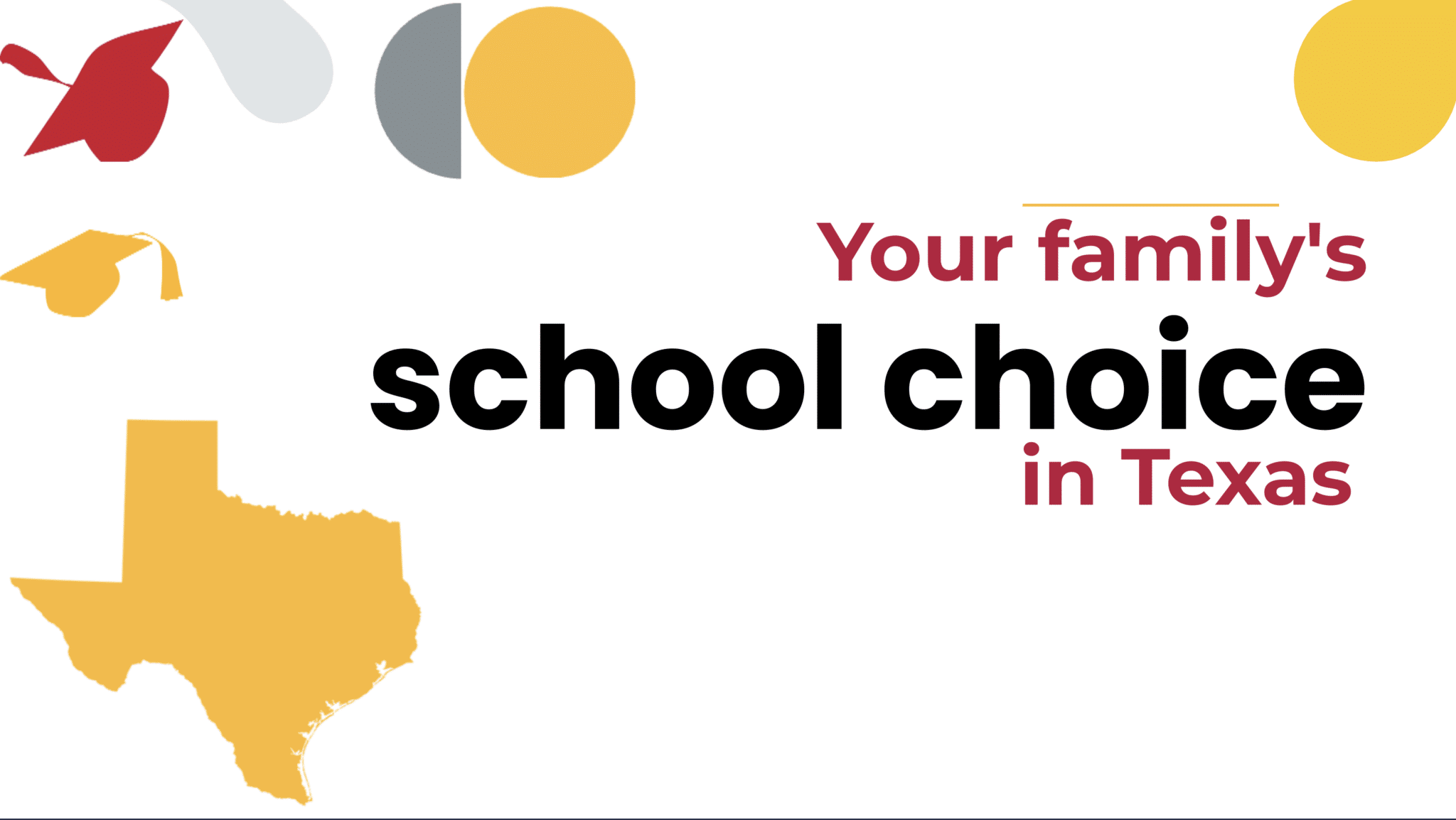Choosing a school? You’ve got options.
Wondering about school choice in Texas? There are a variety of options available for Texas families. Knowing these options can help you find a learning environment where your child is not just “getting by” at school, but actually thriving and inspired to learn.
In Texas, families can choose from traditional public schools, public charter schools, public magnet schools, private schools, online learning, homeschooling, and microschooling and mix-and-match learning.
Looking for special education options? You can learn what special education services are available in Texas at the Ultimate Guide to Special Education.

- Traditional Public Schools
- Public Charter Schools
- Public Magnet Schools
- Private Schools
- Online Schools
- Homeschool
- Microschooling
Texas Traditional Public Schools
Most Texas families choose traditional public schools, which are operated by school districts, free to attend, open to all students, and funded by taxpayers. Currently, 81.3% of K-12 students attend a traditional public school. Did you know that, on average, Texas spends $11,005 per public school student each year?
In Texas, the state allows each district decides to set its own open enrollment policies. Open enrollment refers to whether parents can send their children to any public school, regardless of where it is located. Parents wanting to transfer their child to a different public school than the one they are assigned should contact their local school district to see if this is an option. As an example, Socorro Independent School District allows families to switch schools within the district for qualifying reasons, including afterschool care needs or having a sibling at another school. Note that if your child attends a school on the Texas Public Education Grant list of poorly-performing schools, you are automatically allowed to request a transfer.
Open enrollment is a valuable choice, widening parents’ options and ensuring that their zip code isn’t the sole determiner of their education. Texas’ public schools come in all different flavors. Burbank Middle School, for instance, has a strong dual-language program. And Dallas ISD’s offerings range from International Baccalaureate schools to STEM schools.
Find out more about public schools in your state at the Texas Education Agency. You can also learn more about open enrollment at “Public Schools without Boundaries: A 50-State Ranking.”
Texas Charter Schools
Texas has had charter schools as an option for more than 20 years. Like traditional public schools, charter schools are public, free, and typically have no requirements for entry. What distinguishes charter schools is that they have extra freedom to innovate with learning methods and they are accountable to authorizing bodies for results.
In Texas, 7% of all K-12 students attend a public charter school. Parents can choose from more than 700 charter schools in Texas. Each school has a charter which explains the school’s purpose and what specific community need it serves. That could be providing a STEM program or offering a rigorous, literacy-based curriculum. If there are more families seeking admittance to a charter school than there are seats, a lottery system (like drawing random names out of a hat!) is usually used to determine admittance.
You can read more about these charter offerings at the Texas Education Agency and the Texas Public Charter Schools Association.
Texas Magnet Schools
Magnet schools are free public schools that allow kids to narrow in on a specific learning track, such as an International Baccalaureate program or the performing arts. Magnet schools teach all subjects through the lenses of that specific track. If your child learns well through diving deeply into a particular subject, a magnet school could be a good fit. Currently, 3.8% of all K-12 students attend a public magnet school in Texas.
Texas has many magnet schools. For example, Aldine ISD, Dallas ISD, DeSoto ISD, Galveston ISD, Houston ISD, and Richardson ISD all offer magnet choices. These schools have themes ranging from linguistics to applied technology. One of the state’s newest magnet school programs is the Space and Engineering Technologies Academy (SETA), opening in North East ISD in 2023.
You may also be interested in checking out U.S. News & World Report’s ranking of Texas’ magnet high schools. Please note that the list may not be exhaustive and you should check with your local district about options near you.
Texas Private Schools
Private schools, nonpublic schools that charge tuition, offer a unique learning environment that may include a smaller class size, pass on a specific religious tradition, or provide a different curriculum than is available in your district school.
There are about 2,000 private schools across the state of Texas. The average tuition for private schools in the state is $10,076 for elementary schools and $11,515 for high schools.
There are no state-run scholarship options in Texas, but private scholarships may be available to help families access private school. Also, the federal government allows parents to save for K-12 private school tuition using tax-preferred 529 savings accounts.
Learn more at ACE Scholarships-Texas, the Texas Catholic School Directory, the Texas Private Schools Association, and Private School Review: Texas.
Texas Online Learning
Don’t overlook online learning! It offers a uniquely flexible learning environment that meets a variety of family needs. Whether your child wants to accelerate his or her learning or needs a quieter environment in which to focus, you may be interested in giving virtual school a try.
Texas offers several free, full-time online learning options for students, including tuition-free online schooling through the Texas Virtual School Network’s Online Schools. For the 2023-2024 school year, full-time online schools to choose from in the Texas Virtual School Network include: iUniversity Prep, Texas Virtual Academy at Hallsville, Texas Connections Academy at Houston, Texas Online Preparatory School, eSchool Prep, Digital Academy of Texas, and iSchool Virtual Academy of Texas. Meanwhile, TEXAS Virtual Schools offers eSchool Prep and Lone Star Academy as statewide options.
For Texas district and charter schools, state funding has historically been based on the number of students physically present in classrooms, which has made it tough for schools to fund virtual learning. Still, some school districts and charter networks have developed online schools, such as such as Harmony Virtual Academy and South Texas ISD Virtual Academy. In 2021, Texas lawmakers passed a funding bill to help districts cover the costs of virtual learning. According to the law, district and charter schools that received a C or higher in the latest accountability ratings can receive funding for students enrolled in full-time remote learning in their boundaries. In some cases, district online options may be available to out-of-district students through open enrollment.
Students can also choose part-time options through the Texas Virtual School Network.
To read more about online learning in Texas, check out the Digital Learning Collaborative’s state profile.
Texas Homeschooling
Texas families can also choose to homeschool, which allows for high levels of customized learning and flexibility. Homeschooling is the process of parents educating students at home and all 50 states allow it. The Texas Homeschool Coalition estimates that more than 750,000 students in the state are homeschooled.
The state requires homeschooling parents to teach certain subjects (including math, spelling, and good citizenship), but does not require homeschoolers to take standardized tests. In some cases, homeschooled students may still be eligible to participate in sports or activities at local public schools.
In Texas, it is not required that you provide notice of your intent to homeschool; however, it is recommended that you formally withdraw from your public school so your student is not marked truant. In the case that you decide to return to public school, contact your local school to find out their placement process.
You may also want to check out the Texas Education Agency’s Homeschooling page, the Texas Homeschool Coalition, the Home School Legal Defense Association – Texas, and the Arlington Association of Home Educators.
Texas Microschools and Mix-and-Match Learning
Today, many Texas families are mixing and matching school options to come up with new ways to personalize education. Microschools are one of these ways. A microschool refers to students gathering together in a small group – with adult supervision – to learn, explore, and socialize. Microschools can take a variety of shapes and legal forms, from homeschoolers coming together at an enrichment center to a private school committed to small classrooms. What microschools share in common is a distinct commitment to small-group learning, close-knit relationships, and an emphasis on children as individual learners.
Here are real examples of microschools and related resources in Texas:
- Braveheart Christian Academy in Arlington is a small private school focused on character-based education.
- Wild Roots Collective is a self-directed learning community in Dallas.
- Hedge School Cooperative is an Austin-based homeschooling cooperative that focuses on providing quality education.
- Dallas Hybrid Preparatory is a district-run, hybrid learning arrangement that allows students in grades 4-6 to learn at a “small, boutique campus” two days a week, and at home three three days a week.
- Leading Little Arrows is a hybrid school and multi-cultural co-op located in Arlington that embraces and celebrates students’ diverse cultural backgrounds.
- Spyrja Academy offers a blended learning environment for homeschoolers and students enrolled in online schools, with a focus on innovative instruction and community engagement for high school students.
- Safari Small Schools is an innovative microschool that specializes in serving children with behavioral challenges.
- Great Hearts Online, a classical virtual academy, is piloting classical learning microschools in Texas for families enrolled in their online program.
- Veritas Academy is a “collaborative” hybrid school that focuses on family leadership and togetherness in learning.
- One Acre Farm’s “Farm School” is a learning pod in Porter for children ages four through seven to receive supplemental education with an outdoor focus.
- In an effort to keep learning pods a flexible choice for families, Texas legislators passed a bill in 2021 to protect learning pods from burdensome government regulations.
- The city of Austin has stated that anyone operating a learning pod must have a health and safety plan, and lays out guidelines for when pods must be registered as child care.
Remember, microschooling is more a mentality than a specific legal distinction in most cases. Often, a family participates in a microschool while legally homeschooling, or being enrolled in a private or online school.
Search for Schools Near Me
Microschooling and Mix-and-Match Learning
How can it empower parents and help kids achieve their dreams?
7 Step Guide
Tips to help you find a school where your daughter or son will learn, succeed, and be happy.
Education Resources for
Texas Parents
For additional information about school choices in Texas, visit these resources:
Every state is different when it comes to school choice options.
Sign up below to get a detailed comparison:
"*" indicates required fields
